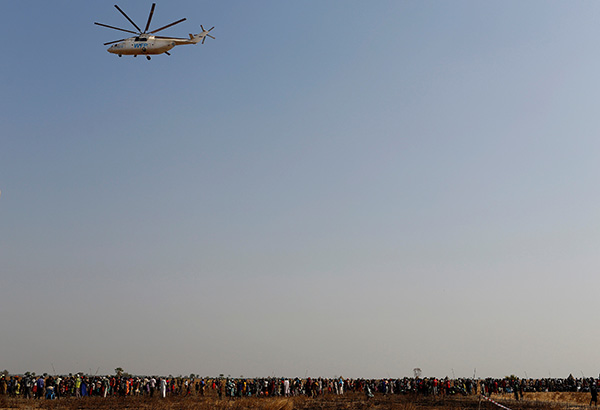UN appeals for funds, relief access to S. Sudanese in need of aid
 |
|
A United Nations World Food Programme (UN WFP) helicopter flies over a queue of people waiting to be registered prior to a food distribution in Thonyor, Leer county, South Sudan, February 25, 2017. [Photo/Agencies] |
JUBA - UN top relief official on Sunday called for immediate and unhindered access to South Sudanese in need of aid and urgent funding for the humanitarian appeal.
Stephen O'Brien, Under-Secretary-General for Humanitarian Affairs and Emergency Relief Coordinator said the UN urgently need additional funding to scale up, sustain and expand life-saving assistance and protection across all of South Sudan.
"We desperately need the fighting to stop. We need calm to prevail now so that we can consistently reach people in dire need, and prevent further catastrophe," O'Brien said in a statement issued in Juba after ending a two-day visit to South Sudan, two weeks after localized famine was declared in Mayendit and Leer counties.
He demanded immediate full and unimpeded humanitarian access and reminded parties to the conflict that International Humanitarian Law must be respected and civilians protected.
During his two-day visit, the UN relief official also met with humanitarian partners and government officials. "The root cause of this suffering is conflict," he said, reflecting what he stressed in his meetings.
"People have been displaced, brutalized and raped. They have been attacked when they sought out assistance. This must stop, and it must stop now," he said.
The humanitarian crisis in South Sudan is rapidly escalating, and hunger and malnutrition have reached new disturbing levels. Fighting, insecurity and lack of access to aid have left some 100,000 people facing starvation and a further 1 million are on the brink of famine.
More than 3.4 million people have been displaced since the conflict began in December 2013, including 1.9 million internally displaced and more than 1.5 million who have fled to neighbouring countries as refugees.
During the visit, the top relief official met with people who had fled fighting, fear and famine in Leer and Mayendit, as well as hunger and insecurity in Lakes.
By July, the humanitarian community estimates that 5.5 million will be severely food insecure. "This is only the beginning of the lean season and, sadly, things could get much, much worse in the months ahead," said O'Brien.
O'Brief said aid workers continue to face multiple obstacles to the delivery of humanitarian assistance across South Sudan, including active hostilities, access denials and bureaucratic impediments.
Frequently, they have to be relocated due to insecurity, escalating tensions or directives from authorities, including recently from Mayendit.
Humanitarian compounds and supplies have been repeatedly looted, most recently during clashes in Mayendit, Jonglei and Kajo-Keji town.
"We have a plan. We are already responding. We are ready to scale up. Now we need the access and the funds to save even more lives," O'Brien said.





















